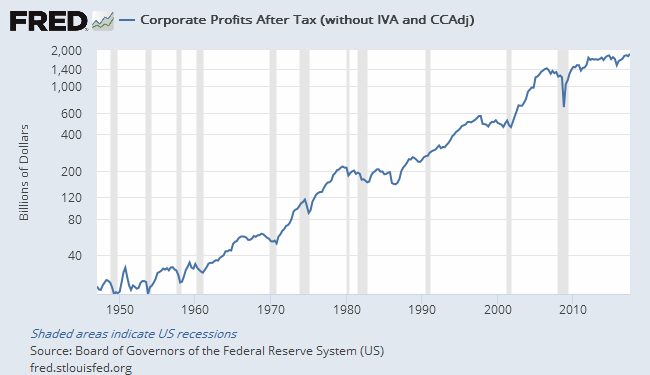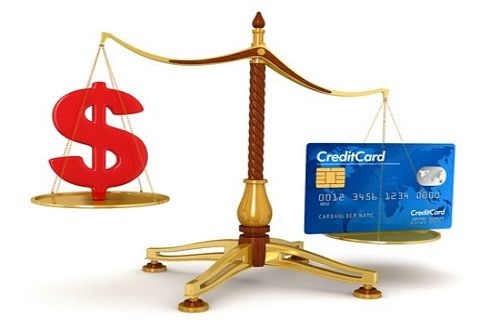Stock investors may well wonder why they should bother with the U.S. economy. Once a fundamental analysis has been conducted and a fundamentally sound company with prospects for future growth is selected, then that’s all that’s required? While the stock investor can invest solely on fundamental analysis, this ignores the fact that companies are businesses which operate in an economic environment and their future prospects are directly affected by the state of the economy.
Stock prices are broadly tied to the ability of companies to increase their profits and the ability of companies to increase their profits is broadly tied to the state of the economy.
The U.S. Department of Commerce (Bureau of Economic Analysis) monitors the profitability of companies and this data is used to produce a chart that shows how the profitably varies over time. The chart is produced by the Federal Reserve Bank of St. Lousis using their FRED (Federal Reserve Economic Data) system. The chart is known as the Corporate Profits and is updated quarterly.
The Corporate Profits chart is shown below in Chart 1. plotted with a log scale.
Chart 1. Corporate Profits.

Chart 1. is produced with FRED (Federal Reserve Economic Data) system from the Federal Reserve Bank of St. Lousis. Data for chart 2 – Corporate Profits After Tax (without IVA and CCAdj) [CP]; last update 2017-Q4. research.stlouisfed.org/fred2/series/CP
Understanding the interaction between businesses and the economy allows stock investors to make wiser and more profitable investment decisions. The savvy stock investor will also analyze the economy for its effect on the company’s ability to generate future revenue and earnings growth. It is the state of the economy which will dictate whether the future revenue and earnings growth are enhanced or inhibited.
All products and services provided by businesses ultimately end up with the consumer whether directly or indirectly. Consumers are simply the general public who require these products and services. Businesses provide these products which can be anything from food to electrical appliances to motor vehicles. Businesses also provide services which can be anything from tax advice to hair dressing to medical care.
Consumers are the general public who use the
products and services provided by businesses
The consumer and the businesses that provide the products and services to the consumer are what makes up the economy.
The basic relationship between businesses and the economy is quite straight forward and can be summed up as follows;
Relationship between businesses and the economy:
- The more money consumers have, the more money consumers spend to acquire products and services.
- The more products and services that businesses provide to consumers, the more money these businesses make.
- The more money businesses make, the more money these businesses are worth.
- The more money these businesses are worth, the higher their stock prices will be.
- The higher the stock prices are, the wealthier the investors are.
- The wealthier the investors are, the more money they have.
- The more money investors have, the more money they spend and thus the cycle repeats.
No doubly what caught the attention of stock investors is that stock prices are tied to the state of the U.S. economy. To be specific, stock prices are tied to business profits and business profits are tied to the economy.

When the products and services that businesses are required to provide increases, they generally need to employ more staff which reduces the unemployment rate. These new employees now have an income and they will naturally spend money to acquire products and services which they previously could not afford. This additional spending adds additional demand for those products and services which further increases the products and services businesses must provide.
This general process is broadly known as an expanding economy. The expanding economy is what makes stock investing profitable and is part of the business cycle. This profitable investing phase is referred to as a Bull market.
Unfortunately for stock investors, the economy cannot keep expanding indefinitely and a correction occurs when the growth in the economy tops out.
When this happens, consumers tighten their spending which leads to less demand for products and services. Since businesses now need to provide less products and services they no longer need the additional staff. The consequence for the employees is that some of them are retrenched and therefore unemployment increases. To make things worse, these retrenched employees now have less money to spend for products and services which further reduces the demand for these.
While the economy is reversing its expansion, business profits are declining along with their worth. This general process is broadly known as a contracting economy and is also referred to as an economic recession if the economy contracts for more than two consecutive quarters. The contracting economy causes stock prices to drop which makes stock investing unprofitable and this phase is referred to as a Bear market.
Fortunately for stock investors, the U.S. economy spends considerably more time expanding than it does contracting.
The economy spends considerably more time
expanding than it does contracting
The contraction phase has averaged around three quarters since 1950 and is generally much shorter than the expansion phase which can be quite long and can be in the order of a decade or more.
By now the stock investor has probably realized why the economy is important to their investment decision making process. Certainly a contracting economy is not good for businesses or the stock market, but it is a natural part of the economic business cycle.
The expanding economy is what attracts the most interest from the general public who due to a buoyant stock market are eager to participate with growth investing being extremely popular with new market participants. While the economy is contracting there are stock investing strategies which capitalize on a temporarily weak business environment with value investing being popular amongst the savvy investors.
